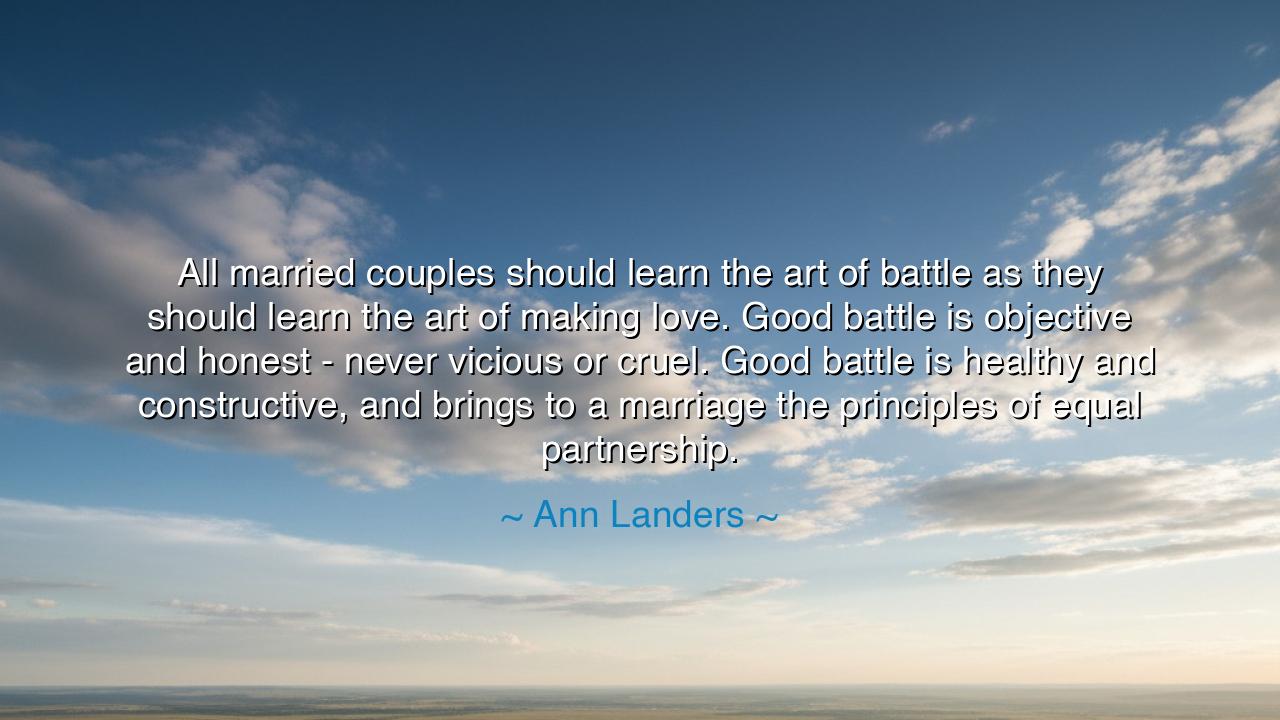
All married couples should learn the art of battle as they should
All married couples should learn the art of battle as they should learn the art of making love. Good battle is objective and honest - never vicious or cruel. Good battle is healthy and constructive, and brings to a marriage the principles of equal partnership.






The words of Ann Landers, wise and discerning, shine with the tempered fire of truth: “All married couples should learn the art of battle as they should learn the art of making love. Good battle is objective and honest — never vicious or cruel. Good battle is healthy and constructive, and brings to a marriage the principles of equal partnership.”
In this saying, she draws from the deep well of human experience, reminding us that love, though tender, is not without conflict. For no union of souls can endure without both passion and confrontation, without both tenderness and truth. Her insight is that the strength of marriage lies not in the absence of quarrels, but in the way two people choose to fight — with honesty, not hostility; with reason, not revenge. The art of love and the art of battle, she teaches, are not opposites but complements, each demanding discipline, respect, and heart.
Ann Landers, the beloved American columnist, was a voice of counsel to millions who sought wisdom about the everyday struggles of life — love, family, and the fragile bond between partners. Through her pen, she became a confidant to generations, translating the complexities of the heart into the clarity of common sense. Her words on marriage came not from theory, but from listening — listening to the triumphs and tragedies of countless lives. She understood that even the most loving marriage must weather the storms of disagreement, for two hearts, however united, remain distinct, and their differences are not curses, but the sparks that shape growth and understanding.
The ancients, too, knew this truth. They taught that harmony is born not of silence, but of balance — the way the yin and yang, though opposing, sustain each other. The art of good battle, as Landers calls it, is the art of maintaining that balance even amid discord. In ancient Sparta, warriors were trained not only to fight fiercely, but to do so with honor — to see their opponent not as an enemy to destroy, but as a teacher to learn from. So it is in marriage. The one you love is not your adversary, but your mirror; in every argument, they reflect to you some truth — about yourself, your patience, your pride, your tenderness. To fight well, then, is not to conquer your partner, but to seek the truth together.
Consider the story of John and Abigail Adams, whose marriage endured through war, politics, and distance. They were often separated for months or years, their union sustained through letters — letters that were sometimes tender, sometimes heated. They debated fiercely about philosophy, faith, and the future of their country, yet always with respect. Their quarrels never sought to wound; they sought to understand. Abigail once wrote, “Do not let our love for each other wear out like an old garment.” Their love survived because their battles were honest, not cruel; each clash was followed by renewal, as though conflict itself had deepened their union. Through their example, we see what Landers meant: that a marriage without battle is not peace, but stagnation.
But Landers also warns us — battle must never turn to cruelty. Words, once spoken in anger, can wound more deeply than weapons. A fight that seeks to humiliate or dominate destroys the equality upon which love stands. In the heart of every argument, there must remain a memory of affection — the silent knowledge that you are fighting not against each other, but for each other. Good battle, she writes, is “objective and honest.” It is guided not by emotion alone, but by the courage to confront truth with compassion. When two people can face conflict without malice, they transform tension into intimacy and disagreement into understanding.
Her wisdom carries a powerful lesson for all generations: love is not fragile; it is forged. It is shaped in the fire of conversation, disagreement, forgiveness, and renewal. Those who fear conflict fear growth, and those who deny anger deny truth. The health of a marriage depends not on how rarely couples fight, but on how justly and kindly they do so. To master the art of good battle is to become artisans of love — crafting with words and patience a relationship that is not broken by strain, but strengthened by it.
So, my child, take this counsel to heart. If you love, then learn also to argue with dignity. When tempers rise, let respect be your shield and honesty your sword. Speak not to win, but to understand. Never strike where you cannot heal, and never let pride silence tenderness. Remember that in every conflict, love must remain the greater cause. For when two people learn both the art of making love and the art of making peace, their marriage becomes what Ann Landers promised — a partnership of equals, fierce yet gentle, imperfect yet unbreakable. And when it works, it becomes one of life’s rarest triumphs — the union of two souls who have learned not just to live together, but to grow together.






AAdministratorAdministrator
Welcome, honored guests. Please leave a comment, we will respond soon